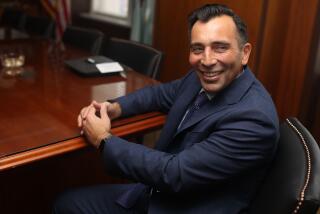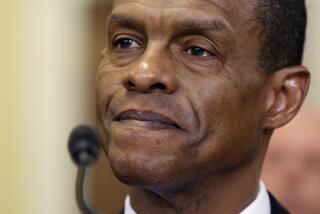Michele Wein Layne is SEC’s new cop on the beat in Los Angeles
Michele Wein Layne decided on a career change 17 years ago when she was at her office at 10 p.m. poring over a mind-numbing legal document.
Layne was an up-and-coming corporate litigation lawyer at a big Los Angeles law firm. But the grueling hours and unrewarding work left her miserable.
She wanted something more meaningful, and soon after joined the Securities and Exchange Commission’s local office as a lawyer fighting investment fraud and insider trading. After a series of promotions, she was chosen last month to lead the 150-person office.
“I don’t think there’s another job outside of government where every day you come to work charged with doing the right thing,” she said. “That’s extremely rewarding. You can’t put a price tag on it.”
Layne is taking on a big task.
Los Angeles is the SEC’s third-largest regional office, behind New York and Chicago, and enforces securities laws in a huge region: Southern California, Arizona, Nevada, Hawaii and Guam. The office typically files 60 to 70 enforcement cases a year, many related to investment fraud.
Layne, 53, said bringing cases to protect individual investors will be a priority under her watch.
“I think my enforcement background will have an impact,” she said. “I’m not afraid to take risks. Sometimes there are risks that are worth taking in bringing cases that are hard, that can be difficult to win.”
The SEC has been criticized in the past for failing to ferret out wrongdoing — most notably, Bernard L. Madoff’s record Ponzi scheme — and bring difficult cases. The agency has made a determined effort to reverse that perception in recent years.
Supporters say Layne is the right person for the job.
“She was one of a very small handful of people whose judgment and advice I relied on the most,” said Randall Lee, who supervised the Los Angeles office from 2001 to 2007.
“The thing that always stood out to me the most is she had the strength of character to do the right thing,” said Lee, now a partner at the Los Angeles office of law firm WilmerHale.
“Sometimes that means bringing a tough case even when all the odds are against you. Sometimes that means deciding not to bring a tough case even when public opinion would demand otherwise.”
Before her promotion, Layne was the office’s associate director for enforcement for seven years.
She helped oversee several high-profile cases, including one against Angelo Mozilo, the former chief executive of Countrywide Financial Corp. He paid a $22.5-million penalty in 2010 to resolve allegations that the company misled investors about the risky nature of its subprime home loans. It was the largest penalty paid to the SEC by the head of a public company.
Layne also was involved in pursing the high-profile stock-options backdating cases against KB Home and Broadcom Corp., as well as an investment fraud case against Danny Pang and his company, Private Equity Management Group Inc.
In discussing her career, Layne said she can’t imagine working as a defense lawyer for a big law firm even though it would mean a significant pay raise.
Helping victimized investors recover financial losses is one of the most rewarding parts of the job, Layne said.
“We believe that’s one of the most important parts of our program, to protect as best we can the retail investor,” Layne said.
Layne, who lives in the Beverlywood neighborhood of Los Angeles with her physician husband, Scott, and their two sons, said she understands the importance of balancing work and family. That is something for which the SEC is better suited than a big law firm.
“In no way is this a 9-to-5 life, but it’s not 24-7, which I think the law firm life increasingly has become,” Layne said.
One of the bigger challenges Layne faces is making the most of the resources she has by deciding which cases the office will pursue. Only a fraction of the leads the office receives result in enforcement cases. The key is to choose cases that are important, with significant abuses or major losses to victims, she said.
“It does create a deterrent effect, which is critical for a public agency, because we don’t have the resources to investigate and charge all wrongdoing,” she said. “It does send a message that the cop is on the beat and they’re watching.”







